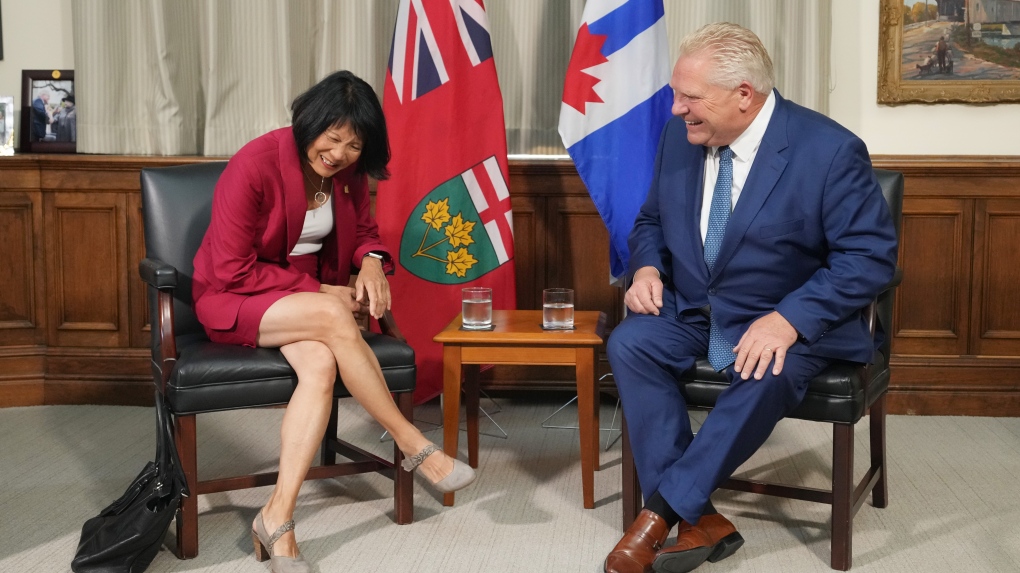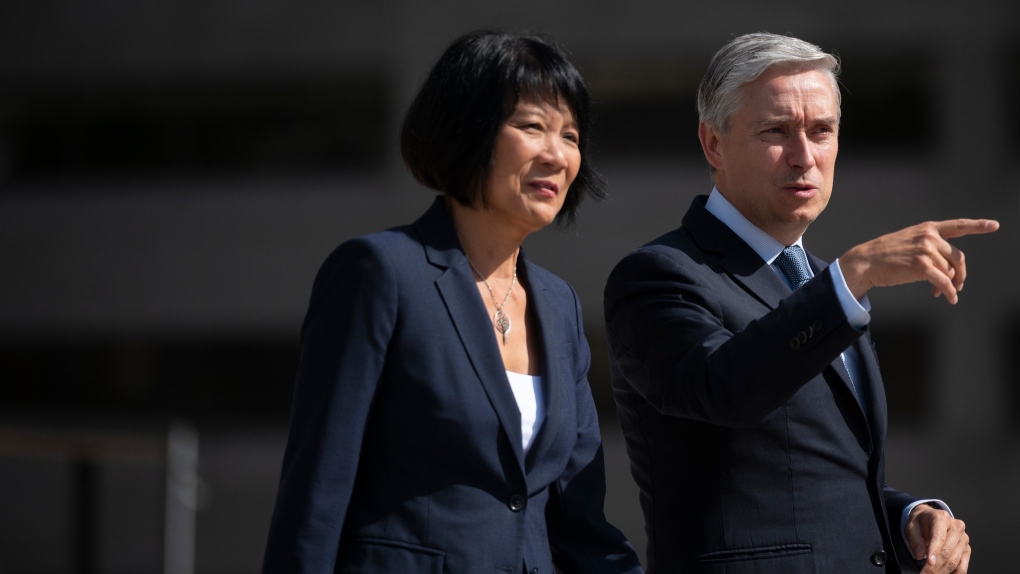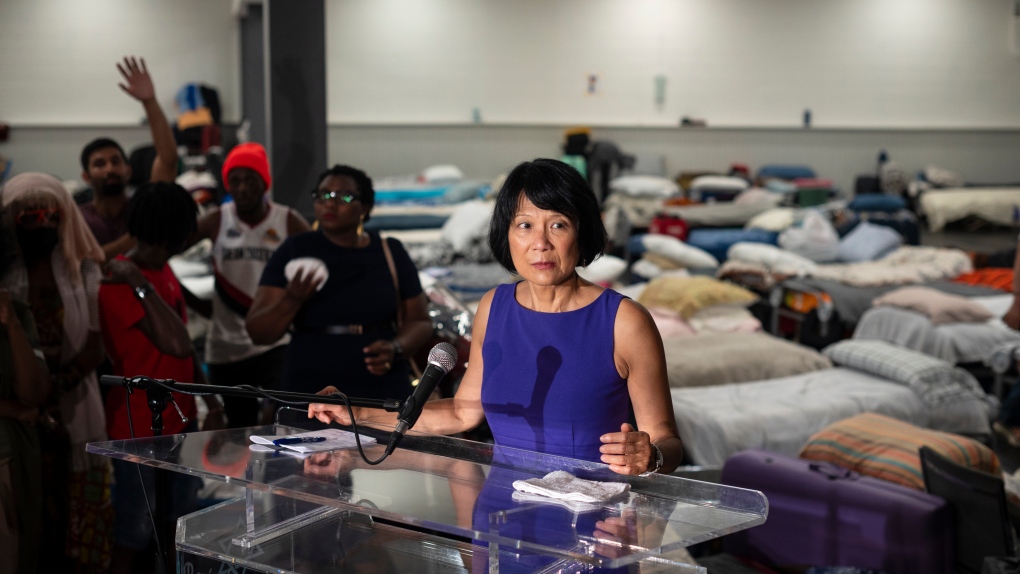After 100 days as Toronto's mayor, Olivia Chow is still flying high. Here's what lies ahead
It’s been a busy few months for Mayor Olivia Chow.
In July, she was sworn into office after a rat race of an election which drew more than 100 competitors.
Chow came to office promising to do things differently and to put people front and centre. She said Toronto needed more affordable housing, better transit, and to be more caring.
Now 100 days in (as of this week), she’s managed to get more done than many critics thought she could.
“It’s been quite wonderful. It is really a complete honour,” Chow told CP24.com in an interview this week about her first few months on the job.
Being able to meet people “all across the city” has inspired her, Chow says.
“It really gives me a sense of how people love their city and how important it is to for us to deliver the best services.”
But the mayor hasn’t just been shaking hands.
Since taking office, she’s gotten the federal government to cough up $97 million to help the city with refugees. She says it’s about half of what Toronto actually needs from the feds to help take care of the 10,000 or so refugees in the shelter system, but it’s a start.
The TTC is still far from perfect, but Chow managed to reverse service cuts which would've impacted vulnerable users and disadvantaged groups adversely. The TTC is also hiring more front-facing staff to make the system safer.
On housing, council has hiked the vacant home tax to discourage people from letting homes sit idle. Chow moved a motion to direct extra money the tax brings in toward a program where the city buys up rental buildings in danger of being converted to condos, thereby helping to maintain the stock of market rental units.
“Being able to do that is really wonderful,” Chow says, while noting that news about more affordable housing is expected soon.
Recent changes to the CafeTO program, Chow says, will hopefully make applications “a lot faster and less frustrating.”
If it feels like Chow is moving faster than others might, it may be because Toronto is facing unprecedented challenges. Despite the absence of many visible signs of the pandemic, the city is still recovering from it and is facing billions of dollars in budgetary pressure both this year, and in the decade ahead.
One of Chow’s first moves in office was in fact to convene a special meeting of the Executive Committee in August to deal with the city’s troubled finances.
While the Ontario government has shut down some of the ideas which were floated, such as a municipal sales tax, others have passed, such as an increase to the land transfer tax for homes over $3 million and lifting on-street parking caps.
Chow has also managed to mend a relationship with Premier Doug Ford, who had said while she was running that her election would be a "disaster" for the city. At a recent meeting at Queen’s Park, the two reminisced about family memories and vowed to work together for the city.
 Toronto Mayor Olivia Chow meets with Ontario Premier Doug Ford at the Queens Park Legislature in Toronto on Monday, Sept. 18, 2023.THE CANADIAN PRESS/Chris Young
Toronto Mayor Olivia Chow meets with Ontario Premier Doug Ford at the Queens Park Legislature in Toronto on Monday, Sept. 18, 2023.THE CANADIAN PRESS/Chris Young
Most notably, the province has agreed to engage with the city on creating a new deal for Toronto. Municipal and provincial staff have been meeting twice a week to work on the deal, with an update expected in November.
While the federal government has so far declined to take part, Chow surmises it may be because they don’t want to negotiate with a single city.
“Possibly because if they do that for Toronto, Vancouver may say ‘What about us?’ Halifax may say the same thing,” Chow says, adding that she plans on working with the Federation of Canadian Municipalities on a cross-country approach.
Even without the federal government, a new deal – if it manages to put Toronto in a position where it does not have to go cap in hand to the province on a regular basis – would be a major victory for the city.
All this from a mayor whose critics said she wouldn’t be able to work with anyone.
“I think the biggest factor is that Ottawa and Queen's Park realize that Olivia Chow changed the channel on our discussion of municipal finance and government finance generally,” Prof. Myer Siemiatyckie told CP24 in an interview.
Siemiatyckie, Professor Emeritus Of Politics at Toronto Metropolitan University, says Chow’s election essentially “ratified” the public understanding that the financial troubles faced by the municipal government amount to a revenue problem and constituted a “rejection” of the idea the city has a spending problem.
“So that's I think, the public mood driver of federal and provincial government attention, reinforced by the fact that Toronto has two dozen plus seats at Queen's Park and in the House of Commons in Ottawa,” Siemiatyckie says. “Toronto matters to getting elected as the premier of this province or getting elected as the prime minister of this country and I think both Mr. Trudeau and Mr. Ford are recognizing that there's kind of a new sensibility and mood on the part of the public that they had better be responsive to.”
 Toronto Mayor Olivia Chow and Minister of Innovation, Science and Industry, François-Philippe Champagne, arrive at City Hall for a press conference announcing wireless service will soon be available to all Toronto subway riders, on Monday, September 11, 2023. THE CANADIAN PRESS/ Tijana Martin
Toronto Mayor Olivia Chow and Minister of Innovation, Science and Industry, François-Philippe Champagne, arrive at City Hall for a press conference announcing wireless service will soon be available to all Toronto subway riders, on Monday, September 11, 2023. THE CANADIAN PRESS/ Tijana Martin
COLLABORATIVE APPROACH ON COUNCIL
Siemiatyckie also credits Chow with bringing a “refreshing” mood to city hall and uniting council.
Chow gave herself barely three weeks from election night to her swearing-in, about half of the four to six weeks mayors customarily get to settle in.
Riding her bike to the swearing-in with a contingent of fellow cyclists ringing their bells, she said that city hall was for people.
To that end, she put together a bipartisan executive committee with councillors from both the downtown core and the suburbs.
“So on her Executive are people who you might associate with her politically and by outlook in their approach to politics, and also people who bring to the table very different perspectives,” he says. “So I think she has been very successful in really providing a united council, a united leadership team to that council.”
 Toronto Mayor Olivia Chow is photographed during a press conference following a tour of Revivaltime Tabernacle Church, where African and Black refugees and asylum seekers received emergency shelter, in North York, Ont., on Friday, July 28, 2023. THE CANADIAN PRESS/ Tijana Martin
Toronto Mayor Olivia Chow is photographed during a press conference following a tour of Revivaltime Tabernacle Church, where African and Black refugees and asylum seekers received emergency shelter, in North York, Ont., on Friday, July 28, 2023. THE CANADIAN PRESS/ Tijana Martin
“And it's been reflected in that a lot of the measures that have come to council so far in the first 100 days have been approved either unanimously or with overwhelming support.”
Siemiatyckie points out that Chow has been part of a council that drew on diverse voices before – when she was a councillor who worked with right-leaning mayor Mel Lastman.
For her part, Chow says the city is “very blessed” to have a number of experienced council members whose experience and passion she can draw on in positions where “they can contribute the most.”
CHOPPIER WATERS COULD LIE AHEAD
While she has had a strong start, there have been some stumbles here and there.
In a rare misfire on social media, she got into hot water recently for some poorly calibrated posts on X on the Israel-Gaza war which drew fire from both sides. The posts, which were deleted the same day with an apology, garnered Chow a frosty reception at a pro-Israel rally on Thanksgiving. Still, she eventually managed to win over the crowd, acknowledging their pain, condemning the Hamas attack, and saying all residents of the city deserve to feel safe.
Some thorny issues lie ahead too, such as the fate of the eastern stretch of the Gardiner Expressway, which is set to be rebuilt. Chow said during the campaign that she would save the city money by turning it into a boulevard instead, but the issue has been polarizing in the past.
She also remains at odds with the province over their plans to build a large private spa and waterpark on part of Ontario Place.
“I don't personally support the private luxury spa by the waterfront,” Chow says. “But are there other places that could accommodate that? Maybe. That's what we're exploring.”
A staff report on possible alternative sites is expected soon.
And while revenue tools so far have mostly targeted wealthier residents, it remains to be seen how well Torontonians stomach other measures, such as a possible property tax hike, if needed.
Whatever the case, Chow has shown she isn’t shy to speak her mind.
She didn’t mince words when the refugee crisis was unfolding on city streets, lashing out at the feds for not paying “a cent” to help.
Asked about Metrolinx’s inability to produce a completion date for the Eglinton Crosstown, Chow audibly sighed and spoke frankly, calling the fiasco “unbearable.”
Honesty, she says, is what people expect from her.
“It’s important that local residents understand what we do, how we spend and what kind of services we have. And when things are not going the way it needs to go, they expect their mayor to say something about it or do something about it. That's what I do,” Chow says. “And you know, we live in a democracy; it's important that we run the government as transparent and as open as possible.”
She gets high marks so far. A recent poll of 817 Torontonians found 75 per cent approve of the job she's doing. Some 17 per cent disapproved, while eight per cent were unsure.
By comparison some 37 per cent said they would vote for the Liberals if a federal election were held today, while just 28 per cent said they would vote for the ruling PC Party if a provincial election were held today. The Liaison Strategies poll, conducted Oct. 3-4, is considered accurate to within 3.43 percentage points, 19 times out of 20.
“I would say that she has also proven herself to be pretty adept at picking up on almost smaller, more localized issues that affect particular cross sections of Toronto's population,” Siemiatyckie says, pointing to the restaurant industry’s frustration with CafeTO as an example.
If her numbers hold, it may well be because people feel heard.
CTVNews.ca Top Stories

W5 Investigates How a convicted con artist may have exploited Airbnb's ID checks in rental scams
In part two of a W5 investigation into landlord scams, correspondent Jon Woodward looks at how hosts on Airbnb may be kept in the dark about their guests' true identities – a situation that a prolific Canadian con artist appears to have taken advantage of.
'She will not be missed': Trump on Freeland's departure from cabinet
As Canadians watched a day of considerable political turmoil for Prime Minister Justin Trudeau and his government given the sudden departure of Chrystia Freeland on Monday, it appears that U.S. president-elect Donald Trump was also watching it unfold.
Canadian government to make border security announcement today: sources
The federal government will make an announcement on new border security measures after question today, CTV News has learned.
Two employees charged in death of assisted care resident who ended up locked outside building overnight
Two employees at an Oshawa assisted living facility are facing charges in connection with the death of a resident who wandered outside the building during the winter and ended up locked outside all night.
The Canada Post strike is over, but it will take time to get back to normal, says spokesperson
Canada Post workers are back on the job after a gruelling four-week strike that halted deliveries across the country, but it could take time before operations are back to normal.
Lion Electric to file for creditor protection
Lion Electric, a Quebec-based manufacturer of electric buses and trucks, says that it plans to file for creditor protection.
Canada's inflation rate down a tick to 1.9% in November
Inflation edged down slightly to 1.9 per cent in November as price growth continued to stabilize in Canada.
Transit riders work together to rescue scared cat from underneath TTC streetcar
A group of TTC riders banded together to rescue a woman's cat from underneath a streetcar in downtown Toronto, saving one of its nine lives.
Trudeau considering his options as leader after Freeland quits cabinet, sources say
Chrystia Freeland, Canada's finance minister, said in an explosive letter published Monday morning that she will quit cabinet. Here's what happened on Monday, Dec. 16.


































